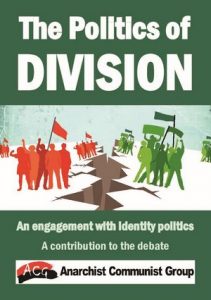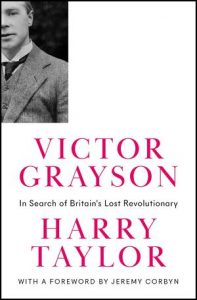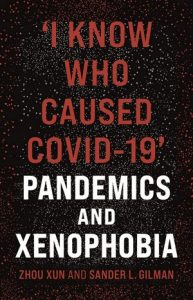Book Reviews
 The Politics of Division. An Engagement with Identity Politics. Anarchist Communist Group. ACG/Stormy Petrel, 2021. 26pp.
The Politics of Division. An Engagement with Identity Politics. Anarchist Communist Group. ACG/Stormy Petrel, 2021. 26pp.
The introduction to this short pamphlet states: ‘We want to create a society in which exploitation is abolished and all resources are held in common. We also struggle for a society without a State and in which no group oppresses another: a society without hierarchies. We envisage a society of co-operation, mutual aid, equality and freedom.’ This clear expression of the Anarchist Communist Group’s aim mirrors very closely the kind of society we seek to see established. We are also in agreement with what ACG have to say about the system we currently live under, capitalism, in which ‘only a few own and control the earth’s resources’ and the vast majority (ie, the working class) ‘need to sell their labour power in order to survive’, with the explanation that they ‘use the term working class to include all those of us who cannot live on the proceeds of their property or capital’.
And the point of this pamphlet is to explain how, if progress is to be made towards establishing that completely new society, the common interest of that vast majority must override the divisions and diversions that are constantly arising within it associated with race, gender, disability or any other type of so-called ‘identity politics’. It gives a readable account of how capitalism has, in its development, used those divisions to its advantage and how, even today, ‘identity politics sets us against each other’ and divides us as a class. It points out how ‘cultural diversity’ is used to divert attention from the shared working-class issue of wage slavery and insecurity and to divide workers from one another, when, in a different kind of cooperative, materially secure, tolerant society, diversity between different people or peoples would be a cause for interest and celebration among everyone. The pamphlet sums up the situation well: ‘Class is the fundamental division in our society, not because it is more important in terms of affecting people’s lives than oppressions such as racism or sexism, but because it is the one thing that unites us into a potential revolutionary movement.’
It follows from this that it is in the interest of the class of wage and salary workers (ie, the vast majority of us) to be as free as possible to spread the idea of a revolutionary change of society, not to be hampered by fear of the kind of censorship that seeks to silence discussion in case it may offend a certain identity group. This is an argument summed up in a section of the pamphlet entitled ‘Identity politics kills freedom of expression and suppresses debate’, which then however goes on to say that ‘a more effective approach is to support the self-organisation of oppressed groups into autonomous groups’. And it is here, in its closing pages, that the pamphlet somewhat loses its way.
Its attempt to argue that ‘autonomous groups’ are less of a diversion from the united interests of workers than identity groups, because the latter focus ‘only on the oppression of the group’, while in the former ‘there is no anti-capitalist perspective that may see other workers as the enemy’ is far from convincing, drifting as it does into discussion of how these autonomous groups might go about influencing, for example, trade unions or the operation of professions, such as the legal one. A far cry this from the earlier call for ‘a completely new society’.
This drift into a focus on relatively minor details of how the capitalist system operates flows, one suspects, from a refusal, endemic among anarchists (even those who share our ambition of a stateless, world society without frontiers, without leaders and led, without money and buying and selling, and based on free access to all goods and services), to contemplate using parliament and the ballot box as democratic revolutionary instruments. The fact is that, as socialists, we cannot reasonably see any other way of achieving the end that both we and many anarcho-communists envisage and we fear that the anarcho-communist rejection of the ballot box marks them out as a tendency which misunderstands an important element of how capitalism works and thus removes credibility from their arguments about how socialism (or anarcho-communism) can be achieved. Our basic point is that the ballot box is a sort of genie that has been let out of the bottle and, though currently used to run and bolster capitalism, once socialist consciousness is widespread, it cannot be put back in but instead can be the tool for getting rid of capitalism, ‘legally’ so to speak.
HOWARD MOSS
 Victor Grayson. In Search of Britain’s Lost Revolutionary. By Harry Taylor. Pluto Press. 2021.
Victor Grayson. In Search of Britain’s Lost Revolutionary. By Harry Taylor. Pluto Press. 2021.
Victor Grayson is still a myth in some left-wing circles, as evidenced by Corbyn writing a foreword for this book. He came to fame when in August 1907 he sensationally won a by-election at the age of 26 while standing as a ‘socialist’ without the backing of the Labour Party.
A member of the ILP, he was a protégé of Robert Blatchford, author of Britain for the British, and his paper The Clarion which campaigned for Labour candidates to stand explicitly as ‘socialists’. This, in opposition to the policy of the ILP’s leaders, Keir Hardie and Ramsay MacDonald, of getting working men into parliament through deals with the Liberals.
Grayson went into parliament as a rebel and didn’t join the Labour Group. He got himself suspended on a number of occasions. The most famous was in October 1908 when he caused a scandal by insisting in the middle of another debate that parliament discuss the plight of the unemployed as a matter of urgency. The Speaker refused and Grayson was escorted out of the chamber by Black Rod. The Labour Group accepted this, some even voting for his expulsion. Outside he made fiery speeches saying that, as the unemployed couldn’t get attention in parliament, they should get it outside, by rioting armed with broken bottles.
Naturally, the Socialist Standard commented on this, in a 2,700-word front-page editorial in November 1908 entitled ‘Revolution: The Problem of the Out of Work’, saying that if incidents like this exposed the Labour parliamentary group as anti-working class ‘it will be of some satisfaction’. It went on to say, however, that ‘Grayson is a man who has no very clear idea of where he stands on questions of economics, who certainly does not understand the Socialist position, and who cannot, therefore, be accepted as in any adequate sense a representative of Socialism.’ The article agreed that rioting might work to get more crumbs from the capitalist state but didn’t advise it. We weren’t the only ones to see him as a bit of a showman and dandy – the March issue had noted him turning up for a debate with a Tory leader ‘in immaculate evening dress (which we suppose is typical of his revolutionary views)’.
He lost his seat in the January 1910 general election but continued to oppose the strategy of the ILP leadership and in 1911 was instrumental in a number of ILP branches breaking away to join the Social Democratic Party (as the SDF had changed its name to by then) to form the British Socialist Party, which was supposed to unite all those calling themselves ‘socialists’ in a single party but just turned out to be SDF 3.0.
When the First World War broke out he took a pro-war stance and was sent by the government to Australia and New Zealand to persuade workers there to join in the slaughter. He himself joined the NZ contingent and fought at Passchendaele, so at least put his money where his mouth was. After the war there was some talk of him re-entering politics but in 1920 he mysteriously disappeared and was never heard of again, and so became the subject of various conspiracy theories.
Taylor recounts his life from his manual working-class background in Liverpool – he was trained as an engineering worker – to his disappearance in 1920. The explanation he offers for this is that he was blackmailed because of past homosexual behaviour into retiring from politics, changing his name and going to live somewhere in Kent where he must have died in the 1940s or 50s.
One conspiracy theory is that this was done to prevent him becoming a radical Labour politician. However, in view of his pro-war stance and the arguments he put forward for it, if he had stayed in politics this was arguably more likely to have been as a Tory, as at one point Taylor hints at.
The Socialist Party gets a couple of mentions. A letter (in full) published in the Brixton and Lambeth Gazette (2 December 1910) when Grayson was a candidate in Kennington in the general election that month, stating that he was not the socialist candidate. The second is a quote from an article in August 1912 (the footnote mistakenly says September) commenting on a passage in Grayson’s book The Problem of Parliament. The article quotes the definition he gave there of socialism which confirmed that his ‘socialism’ was the same elitist state capitalism advocated by the Fabians and the Labour Party. Socialism, he had written, was
‘merely another and better form of government… The ruling of a State or municipality is the highest form of industry and commerce, and must be put in the hands of the most experienced and highly trained men of business who can be discovered… Control by expert officials… that is the ideal before Socialists.’
It is rather strange that left-wing Labourites should still see him as a hero. True, he was a firebrand orator who had called himself a ‘revolutionary socialist’ at one stage of his life, but then so did Mussolini (who also gave up on parliament).
Taylor’s biography is worth reading, especially for those interested in the period up to WWI. It is unfortunate that at one point he seems to suggest that William Morris was a ‘Christian Socialist’.
ALB
 ‘I Know Who Caused COVID-19’: Pandemics and Xenophobia. By Zhou Xun and Sander L. Gilman Reaktion Books £16.
‘I Know Who Caused COVID-19’: Pandemics and Xenophobia. By Zhou Xun and Sander L. Gilman Reaktion Books £16.
Many pandemics have been blamed on minority groups. Jews, for instance, were widely held responsible for the Black Death in the fourteenth century. Here Zhou and Gilman look at a number of examples of ‘outgroups’ (or just ‘them’) being blamed for Covid or its spread, with xenophobia a common response to public health problems.
China was the source of the coronavirus, and recent responses have been similar to nineteenth-century views of Chinese immigrants bringing plague and other diseases to North America from the ‘sick man of Asia’. The source appears to have been a market in Wuhan, a mega-city where many rural migrants have congregated, where the health system has struggled to keep up, and which is located in an area where previous diseases have been transmitted from animals to humans. The Chinese government’s reaction has included attaching blame to Africans and Muslims, who supposedly previously brought swine flu and AIDS to China.
In the US and Israel, the ultra-orthodox Jews, the Haredim, were accused of spreading coronavirus. They often objected to vaccination, the wearing of face masks and the forced closing of synagogues. Their communities in Israel had very high levels of infection and even accused the government, when it tried to enforce measures, of being Nazis. On 6 January, there were Haredim among those who stormed the Capitol, and also anti-semites who wore T-shirts stating 6MWE (for ‘Six Million Wasn’t Enough’)! In the UK, vaccination was sometimes compared to the medical experiments carried out by the Nazis.
Black people in both the US and UK have suffered high levels of infection and morbidity, but the reasons for this are complex. They have poorer health in general than the population as a whole, understandably lack trust in government pronouncements, and were initially reluctant to be vaccinated, though this resistance lessened over time. In the US black people were often unable to get jabbed because vaccination sites were pretty inaccessible, requiring a car to travel to them.
Black Trump supporters were anti-vaxxers, and more generally Trump fans saw themselves as victims of the medical and governmental establishment. Masks were viewed as a sign of weakness, and became for many on the extreme right and other populists a symbol of what was supposedly wrong in the US, with people no longer being able to choose for themselves.
Unlike wars, pandemics do not leave tangible physical reminders behind, but they can result in many different kinds of loss. Setting people against each other is one unfortunate effect.
PB
